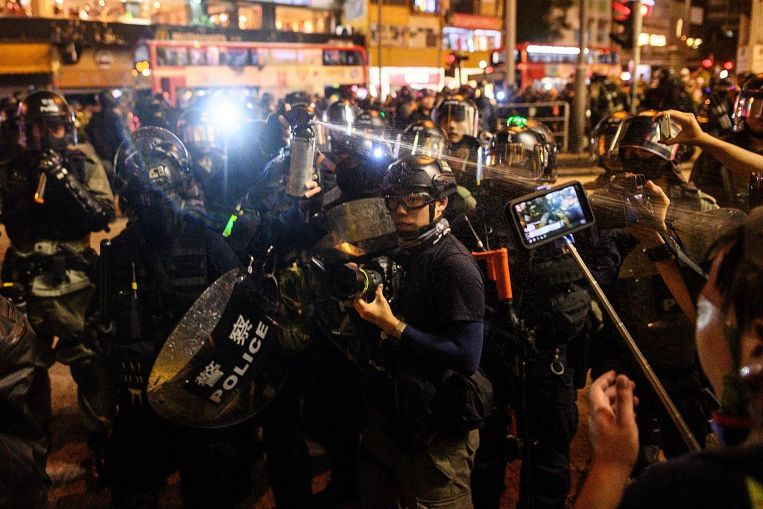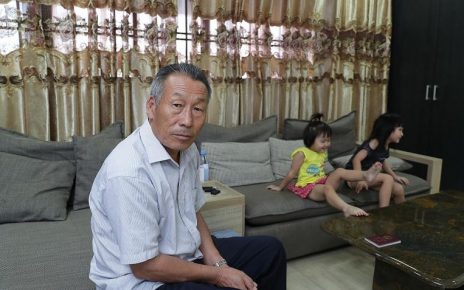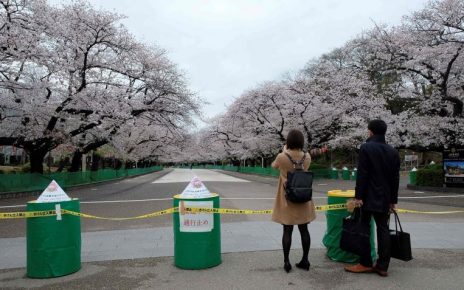
HONG KONG • Protesters in Hong Kong occupied roads and surrounded a police station in Mong Kok – briefly torching a barricade – last night after an earlier plan to block airport access was foiled by heavy police presence.
in Kowloon, which had been shut for the day after many gathered at a makeshift memorial outside. The group also shone strong lasers into the Mong Kok Police Station, the site of clashes between police and protesters the night before.
As officers conducted clearance operations with hundreds of curious onlookers, members of a group called Protect Our Children threw themselves in front of the police while shouting for demonstrators to leave.
At one point, officers deployed pepper spray. Later at night, crowds returned to the police building and the nearby Police Sports and Recreation Club where some tossed projectiles into the building.
The police station and the nearby Prince Edward MTR station have been the target of protester anger because of televised scenes of police beating protesters on a metro train on Aug 31.
Hong Kong’s government yesterday issued a clarification refuting rumours that protesters had died during the MTR incident, calling such allegations “not only false, but also malicious”.
“It is a deep regret that such irresponsible rumour keeps spreading with the ill-intent to mislead general members of the public, and to sow division and discontent in society,” a government spokesman said.
Earlier in the day, hundreds staged sit-ins in shopping malls, including in Sha Tin, where scuffles between officers and protesters late in the evening led to chaotic scenes in the connected metro station.
-
Mahathir: HK protests show limit of ‘one country, two systems’
-
TOKYO • Malaysian Prime Minister Mahathir Mohamad said on Friday that ongoing protests in Hong Kong show the limitations of the territory’s “one country, two systems” framework, and expressed concern that China might not tolerate a further escalation.
Dr Mahathir, making a visit to Japan, said Beijing might use force to end the current impasse if it escalates or persists.
“I never thought that a country with two different systems can really work for any length of time, and sure enough this has happened,” Dr Mahathir said in an interview with NHK public television.
“If they cannot handle this and this doesn’t stop and the demands become more and more for autonomy or independence, then I think the Chinese will not tolerate that.”
Massive protests since June have disrupted transportation links in Hong Kong and its airport.
The territory’s leader announced on Wednesday that she was scrapping an extradition Bill that triggered the demonstrations.
But activists have vowed not to stop protesting until their other demands are met, including an independent probe into alleged police brutality against protesters and greater democracy.
The proposed legislation would have allowed Hong Kong residents to be sent to mainland China for trial, and many saw it as an example of the city’s eroding autonomy since the former British colony returned to Chinese control in 1997.
The protests have become increasingly violent in recent weeks. Hong Kong officials have said they can handle the unrest without the help of mainland security personnel.
The 94-year-old Dr Mahathir, who returned as Malaysia’s prime minister last year, was in Japan’s ancient capital of Kyoto on Friday to receive an honorary doctorate from Doshisha University and visit high-tech companies.
ASSOCIATED PRESS
Protesters last week caused chaos at the airport and the nearby satellite town of Tung Chung by blocking airport approach roads and trashing the MTR station. But the authorities yesterday stepped up security measures to prevent a repeat. Police checked people travelling to the city’s airport for passports and air tickets, preventing protesters gathering for another “stress test” of road and rail links.
They also searched bags of people on buses and trains headed to the airport, where police and press outnumbered passengers.
The Airport Express train service ran from the station in downtown Hong Kong directly to the airport, skipping all stations in between, and only those with flight tickets could enter the terminals, airport officials said.
“We’re a bit nervous seeing all these police. We’ve been watching the fighting on the television and we don’t want to be part of that,” said Mr Kurt Cruzat, a 20-year-old Filipino student on his way to study in Israel. “I’ll be happy once we’re on the plane.”
Three months of sometimes violent protests have at times paralysed parts of the financial hub, amid running street battles between protesters and police who have responded with tear gas, pepper spray and water cannon.
Now in their 14th consecutive week, the protests have brought millions of pro-democracy supporters onto the streets.
On Wednesday, the city’s leader Carrie Lam , a key demand of protesters that she and Beijing had previously refused to budge on.
But it has been widely dismissed by protesters as too little, too late after 1,100 arrests and many facing lengthy jail sentences.
AGENCE FRANCE-PRESSE, REUTERS, BLOOMBERG



